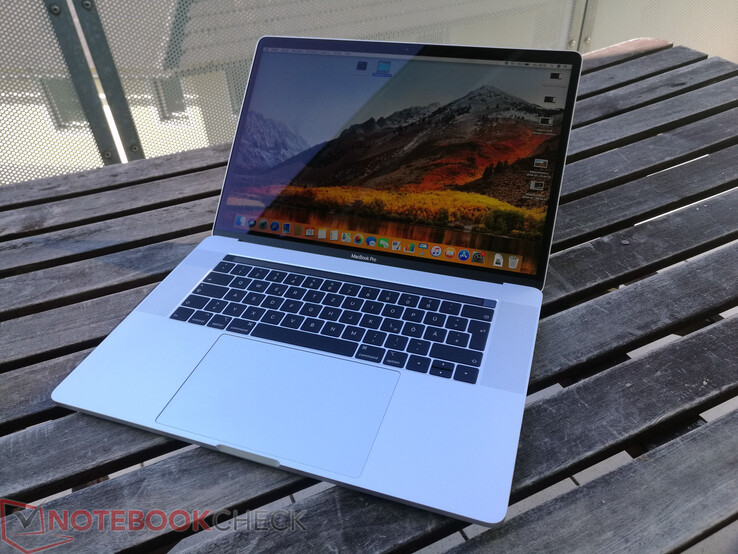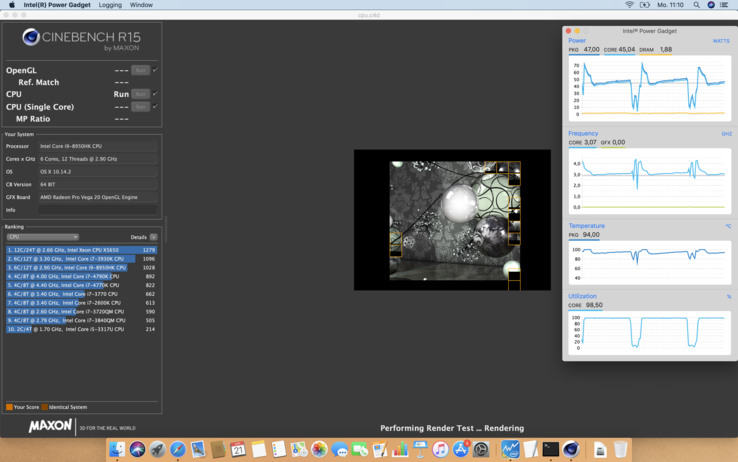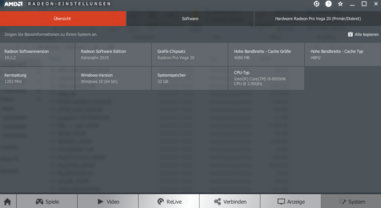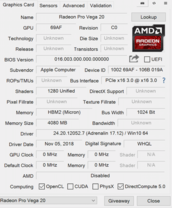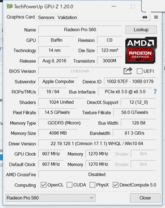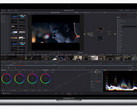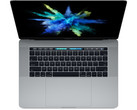Recensione del Computer Portatile Apple MacBook Pro 15 2018 (2.9 GHz i9, Vega 20)

Con una mossa alquanto sorprendente, Apple ha annunciato due nuove GPUs per il MacBook Pro 15 alla fine dello scorso anno. Si tratta di GPUs Vega completamente nuove di AMD. Mentre i due normali chip Radeon Pro (555X e 560X) sono ancora basati sulla vecchia architettura GCN4, le due GPUs Radeon Pro Vega sono basate sull'architettura GCN5. Tuttavia, la potenza termica è molto probabilmente simile (35 watt), quindi dovremo aspettare i risultati del benchmark per vedere quale sia effettivamente il vantaggio in termini di prestazioni. Apple offre solo le due nuove GPUs come aggiornamenti per le SKUs più costose, quindi bisogna pagare altri 300 euro (~$338/Radeon Pro Vega 16) o 420 euro (~$473/Radeon Pro Vega 20) oltre al prezzo base di 3299 euro (~$3715).
Il nostro dispositivo di prova è dotato di tutte le opzioni più costose: Processore Intel Core i9 (+340 Euros/~$383), 32 GB di RAM (+480 Euros/~$541) e un enorme SSD da 4 TB, che costa ben 3840 Euro (~$4324). Il risultato è un prezzo totale di 8379 euro (~$9435).
In questa recensione daremo uno sguardo a diversi aspetti, ma l'attenzione principale è rivolta alle prestazioni dei due nuovi componenti. Siamo particolarmente ansiosi di vedere se la nuova GPU Vega è più efficiente della precedente Radeon Pro o se le capacità termiche limitano le prestazioni. Abbiamo già recensito l'Apple MacBook Pro 15, quindi non copriremo tutte le sezioni di questo articolo. Si prega di consultare le nostre recensioni precedenti per ulteriori informazioni sul case, le porte, i dispositivi di input e il display:
- Apple MacBook Pro 15 2018 (i7, 560X)
- Apple MacBook Pro 15 2017 (i7, 560)
I nostri Top 10
» Top 10 Portatili Multimedia
» Top 10 Portatili Gaming
» Top 10 Portatili Gaming Leggeri
» Top 10 Portatili da Ufficio e Business economici
» Top 10 Portatili Premium da Ufficio/Business
» Top 10 Portatili sotto i 300 Euro
» Top 10 Portatili sotto i 500 Euro
» Top 10 dei Portatili Workstation
» Top 10 Subnotebooks
» Top 10 Ultrabooks
» Top 10 Convertibili
» Top 10 Tablets
» Top 10 Tablets Windows
» Top 10 Smartphones
Prestazioni
Quando Apple ha offerto il processore mobile Core i9 per la prima volta a metà del 2018, ci sono state numerose segnalazioni di utenti Apple delusi dalle basse prestazioni del Core i9. Inizialmente abbiamo avuto problemi anche con il Core i7, ma alla fine Apple ha migliorato la situazione con aggiornamenti software completi.
Eravamo ovviamente ansiosi di scoprire come funziona il Core i9-8950HK nel MacBook Pro 15 dopo gli aggiornamenti e se il costo aggiuntivo di 340 euro o 480 euro (~$383 o ~$541/a seconda della configurazione di base), è giustificato. La risposta è sicuramente no, perché il costoso Core i9 ha solo un piccolo vantaggio in scenari single-core grazie al suo più alto Turbo clock (anche se non raggiunge il massimo di 4.8 GHz).
Una volta che si inizia a stressare più cores, tuttavia, il Core i9-8950HK è leggermente più lento o alla pari con il Core i7-8850H, anche durante la prima esecuzione del Cinebench, che non dura nemmeno 30 secondi con CPUs veloci.
Uno sguardo alla concorrenza non dipinge un quadro positivo neanche per l'Apple MacBook pro. Tutti i rivali Dell, HP e Lenovo con CPU Core i7 o Core i9 sono più veloci. Tuttavia, anche altri produttori hanno problemi con l'i9. Il Dell XPS 15 con l'i9, ad esempio, non è molto più veloce della SKU i7, e il processore mobile Xeon del ThinkPad P1 non può sfruttare il suo potenziale.
Utilizziamo il nostro Cinebench R15 Multi loop per controllare le prestazioni in condizioni di carico di lavoro sostenuto. Si potrebbe dire che le prestazioni non diminuiscono molto dopo la prova iniziale volendo essere positivi, ma la concorrenza è ancora più veloce in generale, nonostante le maggiori perdite percentuali. Anche il MacBook Pro 15 con processore i7 gestisce un risultato medio superiore (1031 vs. 1007 punti).
Abbiamo dato un'occhiata più da vicino al comportamento del processore durante il Cinebench loop. Il consumo sale fino a 90 watt all'inizio, ma si stabilizza immediatamente a 47-52W. Questo è sufficiente per un clock di 6x 3,0-3,2 GHz - abbastanza lontano dai 4,3 GHz massimi (per tutti e sei i core). Non sorprende che i chip mobili non possano sostenere i loro valori di clock turbo massimi, ma il Core i9 del MacBook Pro 15 funziona appena sopra la sua frequenza base di 2,9 GHz.
È ovviamente necessario considerare l'attuale sviluppo di processori mobili, perché Intel ha aumentato il numero di cores, ma senza significativi miglioramenti di efficienza. La soluzione di raffreddamento del MacBook Pro (che è in circolazione da qualche anno) è stata progettata per quad-cores da 45W e dopo i nostri test possiamo dire che il raffreddamento può gestire circa 50W. Le nuove CPU Intel 6-core consumano molta più potenza a clocks elevati e quindi producono più calore, che non può essere dissipato dal sisema di raffreddamento.
Tuttavia, dobbiamo criticare Apple per aver offerto l'i9 anche nell'MBP 15. Il produttore ha certamente notato che l'i9 ha solo un piccolo vantaggio di prestazioni in alcuni scenari durante i test. Se vi aspettate più prestazioni, soprattutto quando l'operazione richiede più di un paio di secondi (il dispositivo è destinato agli utenti professionali, in definitiva), sarete delusi dall'i9. Questo ci dà anche una buona idea di come funzioneranno le due nuove CPUs Core i9 con otto cores. Le prestazioni multi-core saranno un po' più elevate, anche con carichi di lavoro sostenuti (clock più bassi, ma quattro thread in più), ma molto del potenziale di Turbo rimarrà intatto. Solo una verifica mostrerà quanto sarà grande (o se c'è ci sarà qualche vantaggio significativo) il vantaggio in termini di prestazioni. Supponiamo che il clock per 8 cores attivi si aggirerà intorno o leggermente al di sopra della frequenza base di 2.3 GHz, che dovrebbe essere sufficiente per circa 1300-1350 punti nel Cinebench R15 Multi. L'8-core opzionale (fino a 5.0 GHz) per 220 Euro (~$248) non è probabilmente molto più veloce.
Prestazioni di sistema
Elenchiamo anche i risultati dei benchmarks sintetici PCMark per darvi un quadro completo, ma si prega di notare che abbiamo eseguito i benchmarks con Windows via Bootcamp. Questo significa che le prestazioni dipendono dalla qualità dei drivers Bootcamp di Apple. Tuttavia, non abbiamo notato problemi di rilievo, e non è un problema utilizzare Windows su un MacBook Pro se lo si desidera.
Ma torniamo a macOS: non importa quale SKU si scelga, tutte le versioni dell'attuale MacBook Pro 15 sono sistemi molto reattivi e potenti grazie all'archiviazione SSD e ai componenti veloci.
| PCMark 8 Home Score Accelerated v2 | 3816 punti | |
| PCMark 8 Creative Score Accelerated v2 | 5939 punti | |
| PCMark 8 Work Score Accelerated v2 | 4130 punti | |
| PCMark 10 Score | 4545 punti | |
Aiuto | ||
Prestazioni GPU
Le GPUs AMD Vega opzionali sono interessanti aggiornamenti per l'Apple MacBook Pro 15, quindi abbiamo confrontato le prestazioni con i precedenti chip Radeon Pro e la concorrenza basata su Windows in più categorie. La maggior parte dei seguenti benchmarks sono stati eseguiti con Windows; abbiamo utilizzato il software Adrenalin 19.1.2.
Architettura ed efficienza
Apple offre attualmente quattro diverse schede grafiche per il MacBook Pro 15: i due modelli familiari Radeon Pro 555X e 560X e le due nuove GPUs, Radeon Pro Vega 16 e Vega 20. Queste ultime due non sono però disponibili per il modello base, ma solo come upgrade per la più costosa SKU con un prezzo di partenza di 3299 euro (~$3715). La Vega 16 è un aggiornamento da 300 euro, mentre Apple richiede 420 euro (~$473) per la Vega 20.
Ma quali sono le differenze tra la Radeon Pro e la Radeon pro Vega? Il processo di produzione è ancora a 14 nm (FinFET), ma ora è una nuova architettura. I modelli Radeon Pro sono ancora basati sull'architettura GCN4 e le due GPUs Vega su GCN5. La configurazione della memoria è un'altra importante differenza; solo le GPU Vega sono dotate di memoria HBM2, che supporta una maggiore larghezza di banda di memoria.
Apple limita un po' le prestazioni del MacBook Pro 15 con l'alimentatore 87W come abbiamo visto nelle precedenti recensioni, così abbiamo controllato l'efficienza dell'MBP 15 i9/Vega 20 rispetto all'MBP 15 i7/560X con il benchmark Unigine Valley in esecuzione su macOS. Abbiamo elencato i risultati esatti nella tabella sottostante. Considerando un po' di margine per la CPU, stiamo parlando di un miglioramento dell'efficienza di circa il 30% per la Vega 20 rispetto alla Radeon Pro 560X.
| MBP 15 i9/Vega 20 | MBP 15 i7/560X | |
|---|---|---|
| ø Performance | 34 FPS | 21.1 FPS |
| ø Power Consumption | 82.6 Watt | 69.3 Watt |
| FPS/Watt | 0.412 | 0.304 |
Prestazioni OpenGL
I benchmarks della serie Unigine (Heaven & Valley) sono adatti a confrontare le prestazioni di OpenGL e sono disponibili anche per macOS. Un confronto diretto con il risultato di Bootcamp mostra anche un significativo vantaggio in termini di prestazioni a favore di macOS. Per il resto, la Vega 20 è paragonabile alla GeForce GTX 1050 Ti Max-Q del Dell XPS 15 e tra le due GPUs per workstations mobili Quadro P2000 e Quadro P3000. Le due workstations mobili di Dell (Precision 5530) e Lenovo (ThinkPad P1) sono disponibili solo con le Quadro P2000 o P2000 Max-Q, rispettivamente, quindi il laptop Apple ha un vantaggio in questo senso.
| Unigine Valley 1.0 - 1920x1080 Extreme HD Preset OpenGL AA:x8 | |
| Lenovo ThinkPad P71-20HK0004GE | |
| Dell XPS 15 9570 i7 UHD | |
| Apple MacBook Pro 15 2018 (2.9 GHz, Vega 20) (macOS) | |
| Apple MacBook Pro 15 2018 (2.9 GHz, Vega 20) (Win10) | |
| Media AMD Radeon Pro Vega 20 (25.7 - 34.9, n=3) | |
| Fujitsu Celsius H780 | |
| Media della classe Multimedia (19.4 - 26.7, n=2, ultimi 2 anni) | |
| Apple MacBook Pro 15 2018 (2.6 GHz, 560X) (macOS 10.15.1) | |
| Apple MacBook Pro 15 2017 (2.9 GHz, 560) | |
Oltre ai test Unigine, diamo un'occhiata anche alla suite di benchmark SPECviewperf 12 & 13, che consiste in CAD, CAM, MRI e applicazioni per la geologia. Le prestazioni possono variare parecchio a seconda dello scenario e la Vega 20 dell'Apple MacBook Pro 15 si trova tra le due GPUs Quadro P2000 e P3000 nel migliore dei casi, ma in alcuni test può anche essere inferiore alla più piccola Quadro P1000.
Prestazioni OpenCL
Utilizziamo i due benchmarks LuxMark e SiSoft Sandra per le prestazioni di OpenCL, ma quest'ultimo non ha funzionato correttamente sul MacBook Pro con Bootcamp Windows, quindi possiamo solo confrontare i punteggi di LuxMark 2.0. La GPU più importante per il confronto è la Radeon Pro 560X, e la nuova Vega 20 è quasi il 60% più veloce. Il confronto con la concorrenza GeForce, d'altra parte, è un po' inquietante: La Quadro P1000 è stata battuta, ma sia la P2000 che la P2000 Max-Q sono più veloci del 20-25%.
Prestazioni DirectX
La AMD Radeon pro Vega 20 è sorprendentemente buona nel 3DMarks sintetico ed è appena dietro l'attuale GeForce GTX 1650. Anche la Quadro P3000 è a portata di mano o è addirittura battuta, il che è ovviamente il caso anche dei modelli Quadro più piccoli. Siamo inoltre lieti di segnalare che le prestazioni sono stabili e l'MBP 15 non ha problemi a superare lo stress test 3DMark Time Spy (98,7%). Questo non era il caso dell'MBP 15 i7/560X prima che Apple rilasciasse i principali aggiornamenti software lo scorso anno. La Vega 20 è ancora una volta quasi il 60% più veloce della Radeon Pro 560X.
| 3DMark 06 Standard Score | 32864 punti | |
| 3DMark Vantage P Result | 33590 punti | |
| 3DMark 11 Performance | 11353 punti | |
| 3DMark Cloud Gate Standard Score | 21984 punti | |
| 3DMark Fire Strike Score | 7558 punti | |
| 3DMark Time Spy Score | 2732 punti | |
Aiuto | ||
Prestazioni Gaming
L'Apple MacBook Pro 15 con la Radeon Pro Vega 20 gestisce molto bene il gaming se si desidera utilizzare Windows. Anche i titoli dell'App Store ovviamente funzionano, ma la scelta è molto più limitata. Abbiamo avuto solo problemi con i benchmarks nella risoluzione 1366 x 768 pixel, che non è supportata. Per il resto, i nostri benchmarks non hanno causato alcun problema. Si può praticamente usare la maggior parte dei giochi in 1080p e dettagli alti - non è un cattivo risultato.
| basso | medio | alto | ultra | |
|---|---|---|---|---|
| The Witcher 3 (2015) | 119 | 49.6 | 31.8 | |
| Rise of the Tomb Raider (2016) | 120.4 | 87.3 | 74.6 | |
| For Honor (2017) | 179.3 | 64.9 | 61.3 | 49.1 |
| Rocket League (2017) | 236.8 | 190.7 | 122.4 | |
| Far Cry 5 (2018) | 59 | 40 | 37 | 37 |
| F1 2018 (2018) | 142 | 76 | 65 | 44 |
| Shadow of the Tomb Raider (2018) | 111 | 47 | 41 | 35 |
| Hitman 2 (2018) | 64.2 | 52.7 | 48.5 | 45.2 |
| Battlefield V (2018) | 127.1 | 73.7 | 62.6 | 59.6 |
| Darksiders III (2018) | 161.9 | 52.6 | 44.2 | 37.1 |
| Just Cause 4 (2018) | 76.1 | 50.7 | 47.2 | 43.9 |
Pro
Contro
Giudizio Complessivo
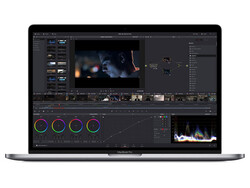
L'introduzione delle nuove GPUs AMD Radeon Pro Vega è stata un po' una sorpresa, ma la nuova GPU lascia un'ottima impressione e si rivela essere un buon aggiornamento. Ci si può aspettare circa il 20% in meno di prestazioni quando si sceglie la Vega 16 (20 contro 16 unità di calcolo), ma la più piccola Vega ha comunque un vantaggio confortevole rispetto alla Radeon Pro 560X.
La situazione è facile per il processore, perché la soluzione di raffreddamento è ancora il fattore limitante. Apple non ha cambiato quest'ultimo da un bel po' di tempo e Intel si limita ad aumentare la velocità del Turbo o ad aggiungere core senza grandi cambiamenti nell'architettura, quindi le CPUs Core i9 opzionali non apportano quasi nulla. Non abbiamo potuto recensire l'MBP 15 con le nuovissime CPU i9 8-core. Ci aspettiamo clocks più bassi per tutti i core attivi, ma ci dovrebbe essere comunque un vantaggio in termini di prestazioni anche con un carico di lavoro sostenuto grazie a quattro threads aggiuntivi. Tuttavia, non aspettatevi molto di più della frequenza base di 2.3 GHz (~1300-1350 punti CB R15 Multi), quindi il verdetto è sempre lo stesso: il MacBook Pro 15 non è la scelta migliore quando avete bisogno della massima quantità di prestazioni della CPU.
Evitate l'aggiornamento della CPU, anche se le GPU opzionali sono opzioni interessanti a seconda dello scenario di utilizzo.
Questo ci lascia con la domanda se il MacBook Pro 15 con Radeon pro Vega sia un dispositivo multimediale o più una workstation mobile. Ci saranno sicuramente utenti per entrambi i casi, e questo influisce anche sulla scelta dei rivali delle principali marche Dell (XPS 15 o Precision 5530), HP (EliteBook 1050 G1 o ZBook Studio G5) e Lenovo (ThinkPad X1 Extreme o ThinkPad P1). Tutti questi modelli offrono prestazioni della CPU leggermente superiori, ma nella maggior parte dei casi non possono tenere il passo con la GPU Vega 20 opzionale. Pensiamo ancora che l'MBP 15 sia principalmente un dispositivo multimediale e il risultato finale del 91% beneficia dell'aumento delle prestazioni della GPU. La valutazione sarebbe diversa per una workstation mobile (i nostri criteri di test) e i benchmarks specifici per workstation (che sono stati eseguiti con Bootcamp Windows) avrebbero un impatto molto maggiore. Il punteggio finale sarebbe comunque buono attestandosi all'87%.
Apple MacBook Pro 15 2018 (2.9 GHz, Vega 20)
- 06/03/2019 v6 (old)
Andreas Osthoff


